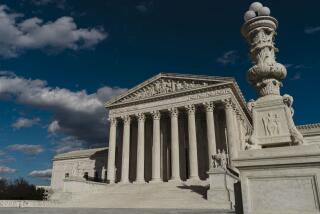Force DUI suspects to have breath, blood tests? High court to rule
WASHINGTON — The Supreme Court will decide whether a police officer who stops a suspected drunk driver can force him or her to take a breath test or have blood drawn at a hospital.
Judges across the nation are split over whether forcing someone to undergo a blood test constitutes an “unreasonable search” prohibited by the 4th Amendment.
The decision, due early next year, will define the powers of the police and the rights of motorists who are suspected of driving while intoxicated.
The justices agreed Tuesday to hear an appeal from Missouri prosecutors who argued that because alcohol in the body quickly dissipates, police need to act quickly and require suspected drunk drivers to undergo either a breath test or a blood test.
But lawyers for the American Civil Liberties Union argued that a police officer must obtain a search warrant from a magistrate before compelling a suspect to undergo a blood test.
In March, the Missouri Supreme Court threw out the blood evidence used against an alleged drunk driver and ruled that police must obtain a search warrant before forcing a suspect to undergo a blood test.
The case began when Tyler McNeely was stopped for speeding about 2 a.m. by a Missouri highway patrol officer. The officer said McNeely’s speech was slurred, and he smelled of alcohol. When he stepped out of his car, the motorist was unsteady on his feet and failed the roadside sobriety tests.
But when put in a patrol car, McNeely refused to provide a breath sample. In response, the officer drove him to a hospital where he ordered a lab technician to draw a blood sample from the suspect. The alcohol content was 0.154, nearly double the legal limit of .08%. The officer made no attempt to obtain a search warrant.
In court, McNeely said the incriminating test results should be thrown out because the forced blood draw violated his rights under the 4th Amendment. A trial judge agreed, and the state high court affirmed the ruling.
The Supreme Court justices gathered Monday to go over appeals that arrived during the summer, and they announced Tuesday they will hear several new cases, including Missouri vs. McNeely.
ALSO:
Texas congressional candidates hold debate in Spanish
North Carolina killer escapes from minimum-security prison
Creationist to Bill Nye: Kids should be aware of evolution’s flaws
More to Read
Sign up for Essential California
The most important California stories and recommendations in your inbox every morning.
You may occasionally receive promotional content from the Los Angeles Times.











